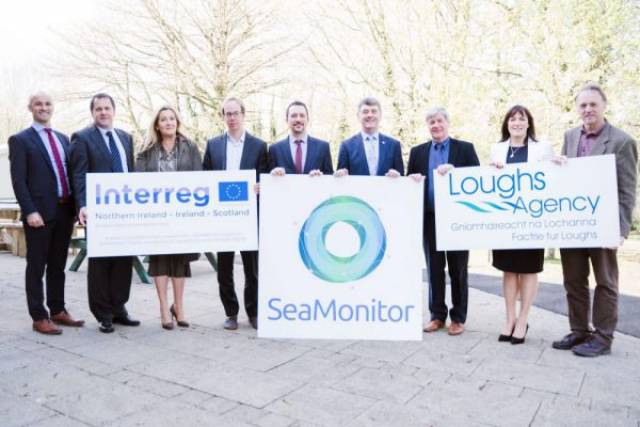A unique marine research project, the first of its kind in Europe, studying the seas around Ireland, Western Scotland and Northern Ireland was launched this week in Derry–Londonderry. The SeaMonitor project is led by the Loughs Agency and supported by another eight leading marine research institutions using innovative marine species tracking technology to better understand and protect vulnerable marine life in our oceans.
Funding for the SeaMonitor project has been provided by the EU’s INTERREG VA Programme (Environment Theme), which is managed by the Special EU Programmes Body (SEUPB), to the tune of €4.6m. Match-funding for this project has been provided by the Department for Agriculture, Environment and Rural Affairs in Northern Ireland and the Department of Housing, Planning and Local Government in Ireland. This substantial investment will extend the existing network of ‘smart’ buoys and oceanographic models – delivered by sister projects COMPASS and MarPAMM – so that a line of acoustic receivers runs between the island of Ireland and Scotland.
The SeaMonitor project will deliver Europe’s largest telemetric marine array and spatial models supporting the conservation of basking shark, cetaceans, salmon, seals and skate. It will also provide three Management Plans; one for skate in the area from Loch Sunart to the Sound of Jura and two for salmon in both the River Foyle and Clyde estuaries.
Loughs Agency Designated Officer, Sharon McMahon, explained: “For over twenty-one years, the Loughs Agency has been at the forefront of protection and conservation of our local waters and aquaculture. So we are really excited to be leading the way alongside expert colleagues from statutory and academic institutions and a range of stakeholders that will ultimately produce dynamic management plans for some of our most important and vulnerable species”.
Welcoming the project Gina McIntyre, CEO of the Special EU Programmes Body, said; “The maritime territory across Europe is at risk from multiple challenges and must be protected for future generations of citizens. This tri-regional project will help to safeguard our precious shared marine environment by providing much-needed management and conservation work that will protect priority species and habitats, across Ireland, Northern Ireland and Western Scotland.”
John Speers, Marine and Fisheries Director at the Department of Agriculture, Environment and Rural Affairs in Northern Ireland, said “I am pleased to support the SeaMonitor project, which will use the best available technology to track some of our most important marine species. These animals spend the most of their lives hidden from view and are only occasionally seen at the surface, making monitoring them very challenging. The SeaMonitor project will help us better understand their life cycles and improve protection of these important marine species.”

































































